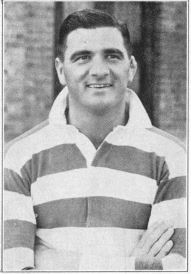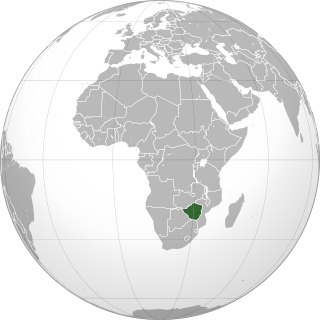Related Research Articles
Until roughly 2,000 years ago, Zimbabwe was populated by ancestors of the San people. Bantu inhabitants of the region arrived and developed ceramic production in the area. A series of trading empires emerged, including the Kingdom of Mapungubwe and Kingdom of Zimbabwe. In the 1880s, the British South Africa Company began its activities in the region, leading to the colonial era in Southern Rhodesia.

Zimbabwe, officially the Republic of Zimbabwe, is a landlocked country located in Southeast Africa, between the Zambezi and Limpopo Rivers, bordered by South Africa to the south, Botswana to the south-west, Zambia to the north, and Mozambique to the east. The capital and largest city is Harare. The second largest city is Bulawayo. A country of roughly 15 million people, Zimbabwe has 16 official languages, with English, Shona, and Ndebele the most common.

Land reform in Zimbabwe officially began in 1980 with the signing of the Lancaster House Agreement, as an effort to more equitably distribute land between black subsistence farmers and white Zimbabweans of European ancestry, who had traditionally enjoyed superior political and economic status. The programme's stated targets were intended to alter the ethnic balance of land ownership.
White Zimbabweans are people in Zimbabwe who are of White (European) descent. In linguistic, cultural, and historical terms, these Zimbabweans of European ethnic origin are divided among the English-speaking descendants of British settlers, the Afrikaans-speaking descendants of Afrikaners from South Africa, and those descended from Greek and Portuguese immigrants.

Solomon Mujuru, also known by his nom-de-guerre, Rex Nhongo, was a Zimbabwean military officer and politician who led Robert Mugabe's guerrilla forces during the Rhodesian Bush War. He was from the Zezuru clan. In post-independence Zimbabwe, he went on to become army chief before leaving government service in 1995. After leaving his post in the Zimbabwe National Army, he got into politics becoming Member of Parliament for Chikomba on a Zanu PF ticket. He was generally regarded as one of the most feared men in Zimbabwe. His wife, Joice Mujuru, became Vice-President of Zimbabwe in 2004.
Timothy John Stamps was a Zimbabwean politician and doctor who served in the Government of Zimbabwe as Minister of Health from 1986 to 2002. For most of that period, he was the only white member of the government.

A constitutional referendum was held in Zimbabwe on 12–13 February 2000. The proposed new Constitution of Zimbabwe, which had been drafted by a Constitutional Convention the previous year, was defeated. The defeat was unexpected and was taken as a personal rebuff for President Robert Mugabe and a political triumph for the newly formed opposition group, the Movement for Democratic Change. The new proposed constitution was notable for giving power to the government to seize farms owned by white farmers, without compensation, and transfer them to black farm owners as part of a scheme of land reform.
Francis Nhema is a Zimbabwean politician, who served as Minister of Youth Development, Indigenisation and Empowerment from 2013 to 2014.

Didymus Noel Edwin Mutasa is a Zimbabwean politician who served as Zimbabwe's Speaker of Parliament from 1980 to 1990. Subsequently he held various ministerial posts working under President Robert Mugabe in the President's Office. He was Minister of State for Presidential Affairs from 2009 to 2014 and also served as ZANU-PF's Secretary for Administration.
Zimbabwe began experiencing a period of considerable political and economic upheaval in 1999. Opposition to President Mugabe and the ZANU-PF government grew considerably after the mid-1990s in part due to worsening economic and human rights conditions. The Movement for Democratic Change (MDC) was established in September 1999 as an opposition party founded by trade unionist Morgan Tsvangirai.
Dr. Samuel Creighton Mumbengegwi was a Zimbabwean politician. He was the brother of the former Minister of Foreign Affairs, Dr. Simba Mumbengegwi.

Robert Gabriel Mugabe was a Zimbabwean revolutionary and politician who served as Prime Minister of Zimbabwe from 1980 to 1987 and then as President from 1987 to 2017. He served as Leader of the Zimbabwe African National Union (ZANU) from 1975 to 1980 and led its successor political party, the ZANU – Patriotic Front (ZANU–PF), from 1980 to 2017. Ideologically an African nationalist, during the 1970s and 1980s he identified as a Marxist–Leninist, and as a socialist after the 1990s.
Mike Campbell (Pvt) Ltd et al. v. Republic of Zimbabwe is a case decided by the Southern African Development Community (SADC) Tribunal. The Tribunal held that the Zimbabwean government violated the organisation's treaty by denying access to the courts and engaging in racial discrimination against white farmers whose lands had been confiscated under the land reform program in Zimbabwe.
Sabina Gabriel Mugabe was a Zimbabwean politician. She was the younger sister of the former Zimbabwean president Robert Mugabe.
William Michael Campbell was a white African farmer from the district of Chegutu in Zimbabwe. Together with his son-in-law Ben Freeth, he rose to international prominence for suing the regime of Robert Mugabe of violating rule of law and human rights in Zimbabwe, in the case of Mike Campbell (Pvt) Ltd and Others v Republic of Zimbabwe. His struggle was the subject of an award-winning documentary, Mugabe and the White African.

Jenni Williams is a Zimbabwean human rights activist and a founder of Women of Zimbabwe Arise (Woza). A prominent critic of President Robert Mugabe's government, The Guardian described her in 2009 as "one of the most troublesome thorns in Mugabe's side".
James Hamilton Iain Kay is a Zimbabwean farmer and politician who served in the House of Assembly from 2009 to 2013. Previously, he was a commercial farmer near Marondera, Mashonaland East Province. He was also the subject of violent attacks by ZANU–PF war veterans during the land reform program after the 2000 parliamentary elections.
John Maurice "Jock" Kay was a Zimbabwean farmer and politician. A member of the House of Assembly of Zimbabwe from 1983 to 1990, he served as the Deputy Minister of Lands, Agriculture and Rural Resettlement from 1988 to 1990. He entered Parliament as an independent, before joining the ruling ZANU–PF party in 1987.

John Clother Morkel was a South African-born Rhodesian international rugby union player. He was born in Cape Town, Union of South Africa and was the captain of the Rhodesia national rugby union team and played as a lock.

Squatting in Zimbabwe is the settlement of land or buildings without the permission of the owner. Squatting began under colonialism. After Zimbabwe was created in 1980, peasant farmers and squatters disputed the distribution of land. Informal settlements have developed on the periphery of cities such as Chitungwiza and the capital Harare. In 2005, Operation Murambatsvina evicted an estimated 700,000 people.
References
- ↑ "Player profile: Charlie Lock". Cricinfo . Retrieved 11 February 2006.
- ↑ Thornycroft, Peta (2 October 2007). "Zimbabwe's last white farmers face final push". Daily Telegraph. Archived from the original on 11 October 2007.